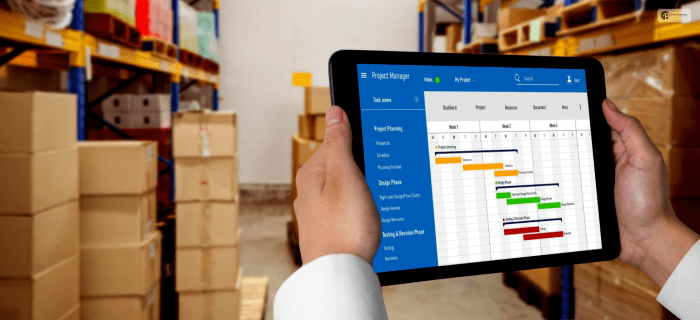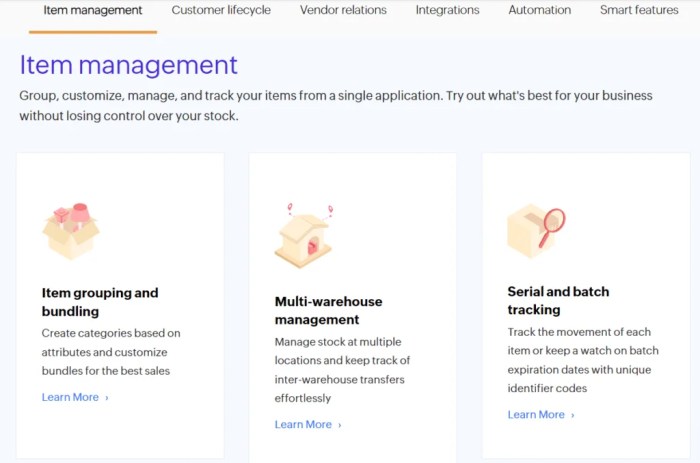Inventory management small business software – Running a small business can be challenging, especially when it comes to keeping track of inventory. Effective inventory management is crucial for profitability, customer satisfaction, and overall business success. This comprehensive guide explores the importance of inventory management software for small businesses, highlighting key features, benefits, and considerations.
Understanding the Importance of Inventory Management
Accurate inventory tracking is vital for several reasons. It helps prevent stockouts, minimizes overstocking, and allows for better forecasting. Without a robust system, small businesses risk losing sales due to unavailable products, tying up capital in excess inventory, and ultimately impacting profitability. Efficient inventory management directly translates to optimized cash flow and improved operational efficiency. This is especially true for small businesses with limited resources and staff.
Key Challenges in Inventory Management for Small Businesses, Inventory management small business software
- Limited Resources: Small businesses often have constrained budgets and limited staff, making manual inventory tracking cumbersome and prone to errors.
- Growth and Expansion: As a business grows, its inventory management needs become more complex. Manual systems struggle to keep pace with scaling operations.
- Accuracy and Real-Time Data: Maintaining accurate inventory records in real-time is crucial for informed decision-making. Manual methods often fall short in this aspect.
- Order Fulfillment and Customer Service: Efficient order fulfillment is directly linked to accurate inventory data. Stockouts and delays can negatively impact customer satisfaction.
Inventory Management Software Solutions for Small Businesses
Inventory management software offers a sophisticated solution to these challenges. These systems automate various tasks, providing a centralized platform for managing all aspects of inventory. A well-chosen software solution can streamline operations, reduce errors, and boost efficiency.
Features to Look for in Inventory Management Software
- Real-time Tracking: The software should provide up-to-the-minute visibility into inventory levels.
- Automated Ordering: Setting reorder points and automating the ordering process can minimize stockouts and optimize supply chains.
- Multi-Channel Management: If your business sells through multiple channels (e.g., online store, physical store), the software should seamlessly manage inventory across all platforms.
- Reporting and Analytics: Comprehensive reports on sales, inventory turnover, and other key metrics help businesses make data-driven decisions.
- Integration Capabilities: Integration with other business applications, like accounting software, can streamline workflows.
Types of Inventory Management Software
Various types of inventory management software cater to different needs and budgets. Some popular options include cloud-based solutions, on-premise software, and open-source options. Each type has its own set of advantages and disadvantages. Choosing the right software depends on factors like business size, budget, and specific requirements.

Source: sbnewsroom.com
Benefits of Using Inventory Management Software
Implementing inventory management software delivers numerous benefits. It leads to improved accuracy, reduced costs, increased efficiency, and ultimately, higher profits.
Specific Benefits for Small Businesses
- Cost Savings: Reduced labor costs, minimized stockouts, and better forecasting translate to significant cost savings.
- Improved Efficiency: Automation streamlines processes, enabling staff to focus on other critical tasks.
- Data-Driven Decisions: Access to real-time data empowers businesses to make informed decisions about inventory levels, pricing, and sales strategies.
- Enhanced Customer Satisfaction: Reduced order fulfillment times and minimized stockouts result in happier customers.
Choosing the Right Software for Your Small Business
Several factors need consideration when selecting inventory management software. Budget, business size, specific needs, and scalability are key elements.
Factors to Consider
- Budget: Software options vary significantly in price. Consider your budget and choose a solution that fits within your financial constraints.
- Business Size: A small business with limited inventory will have different needs than a larger company.
- Specific Requirements: Identify your unique needs and look for software that addresses them directly.
- Scalability: Choose software that can adapt as your business grows and your inventory needs evolve.
Frequently Asked Questions (FAQ)
Here are some frequently asked questions about inventory management software for small businesses.
- Q: How much does inventory management software cost?
A: Costs vary greatly depending on the features, vendor, and subscription model.
- Q: What are the different types of inventory management software?
A: Options include cloud-based, on-premise, and open-source solutions.
- Q: Can I integrate my inventory software with other business applications?
A: Many modern solutions offer integrations with accounting software, e-commerce platforms, and more.
- Q: How do I choose the right inventory management software for my business?
A: Consider your budget, business size, specific needs, and future growth plans.
Call to Action: Inventory Management Small Business Software
Ready to take control of your inventory and boost your small business? Explore the various inventory management software solutions available today. Start by researching options that align with your specific needs and budget. A well-chosen solution can transform your inventory management, leading to greater efficiency, reduced costs, and improved profitability. Visit [insert website link here] to discover more about our inventory management software solutions.
Quick FAQs
What are the typical costs associated with inventory management software for small businesses?

Source: ecomweaver.com
Software costs vary significantly depending on the features offered, the number of users, and the chosen subscription model. Some options are freemium, with basic features offered for free and premium features available through subscriptions. Others are based on a one-time purchase or annual licensing fee. It’s best to research and compare different software options to find a solution that fits your budget and needs.
How does inventory management software help with forecasting?
Inventory management software often includes robust reporting and analytical tools that allow you to track historical sales data, identify trends, and project future demand. This data-driven approach empowers you to make more accurate forecasts and optimize your inventory levels, reducing the risk of stockouts or overstocking.
Can this software integrate with other business systems?
Many inventory management solutions offer integrations with popular accounting software, e-commerce platforms, and point-of-sale systems. This integration streamlines data flow between different aspects of your business, providing a holistic view of your operations and improving overall efficiency.